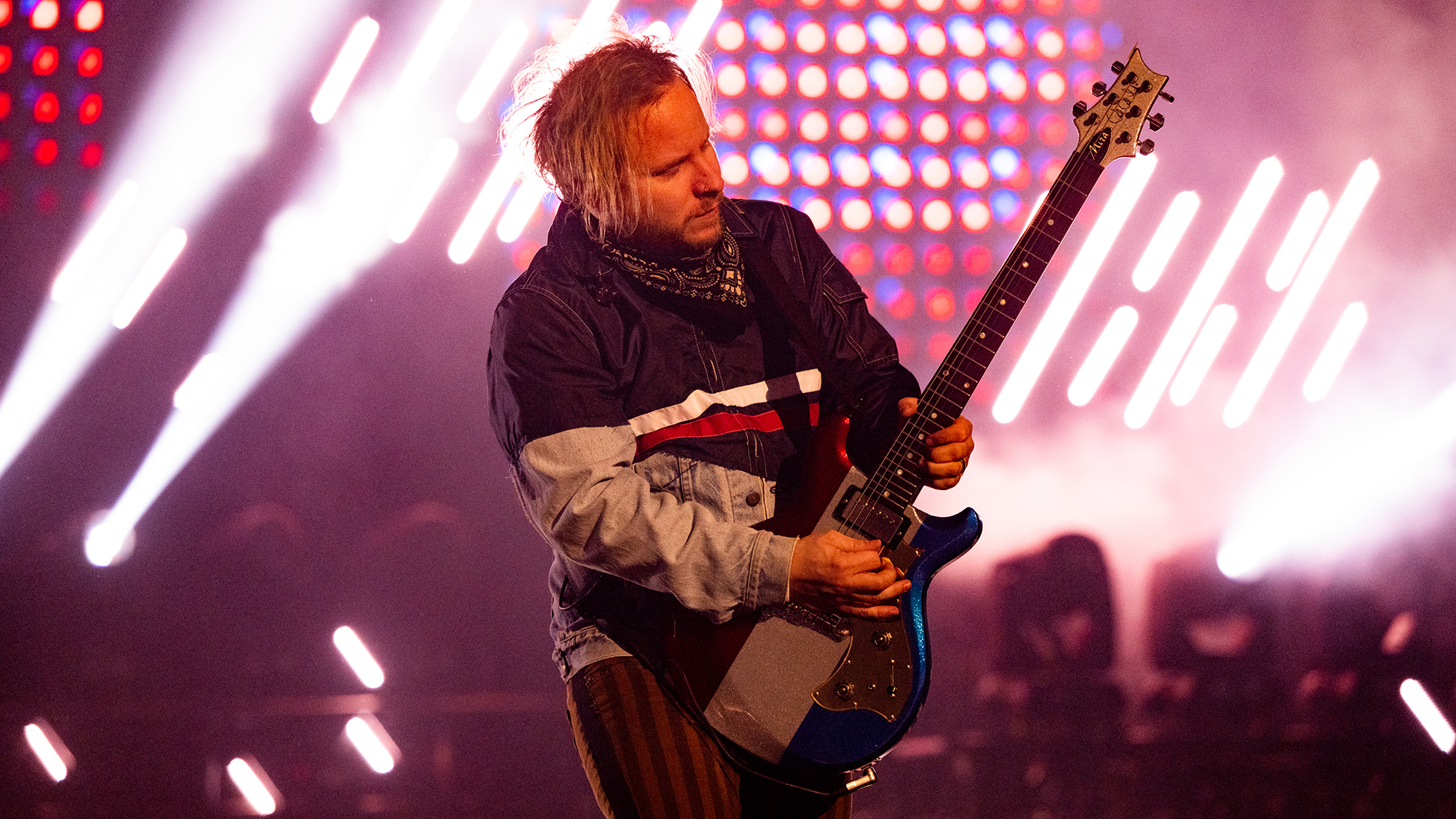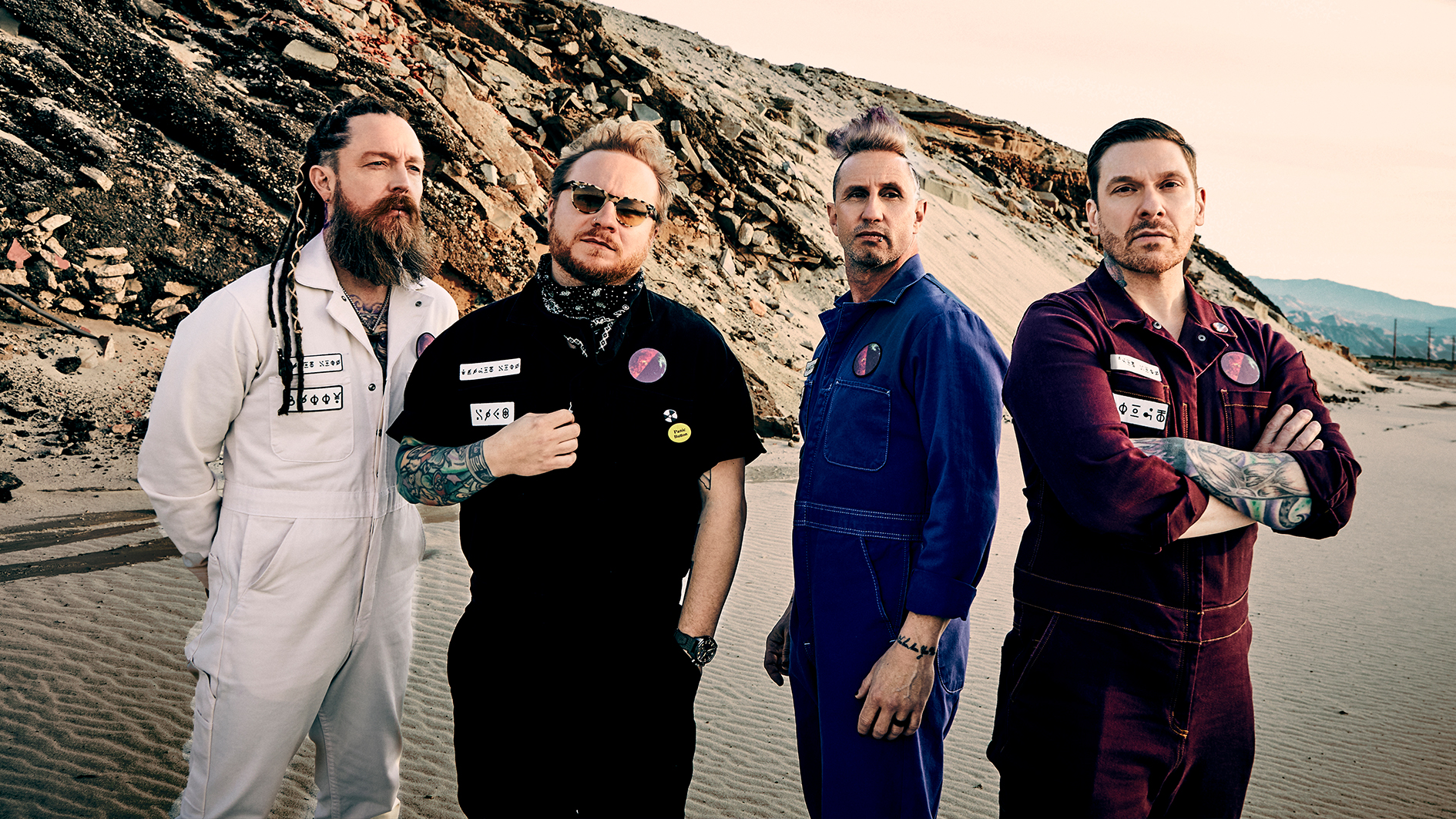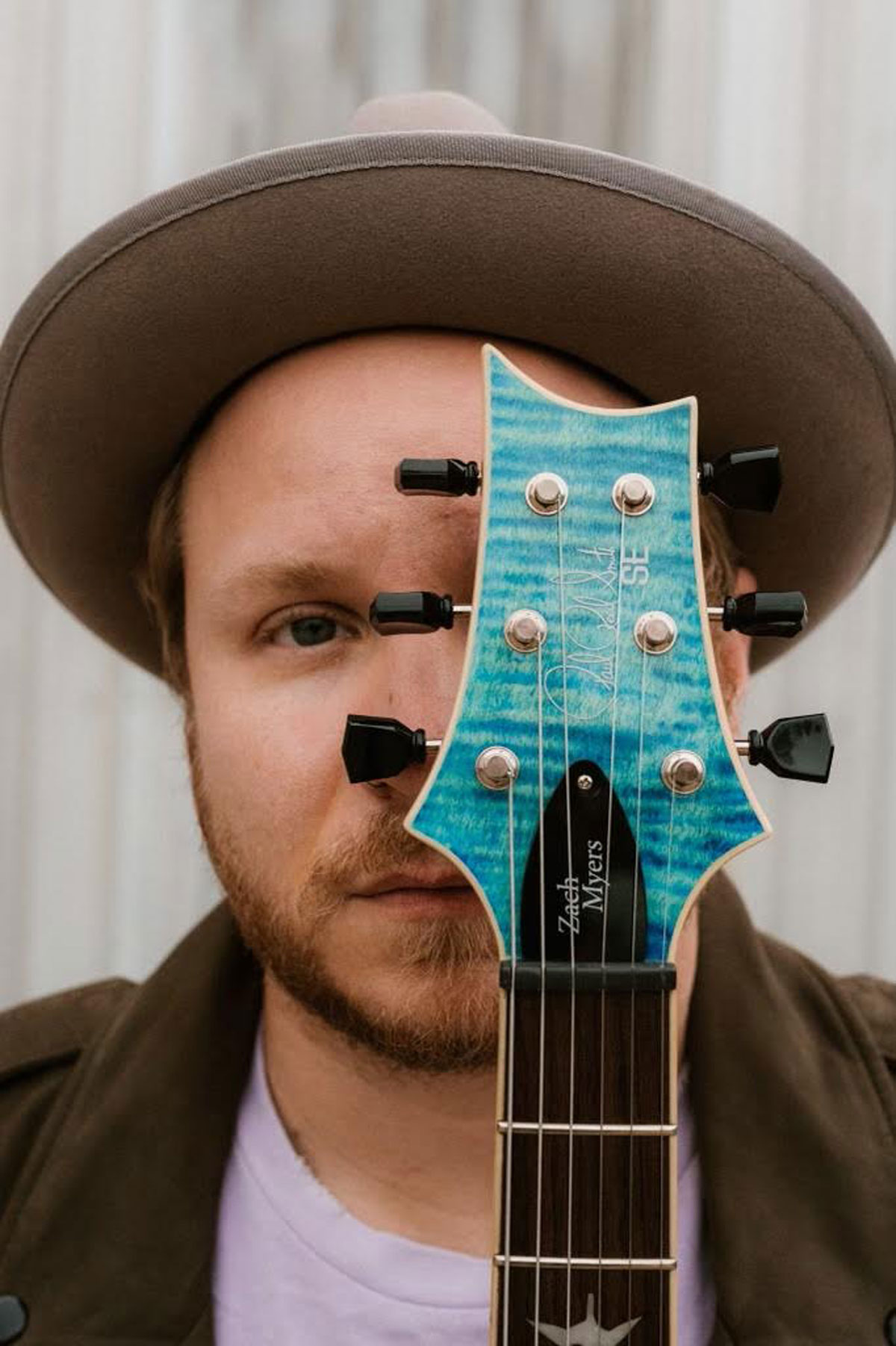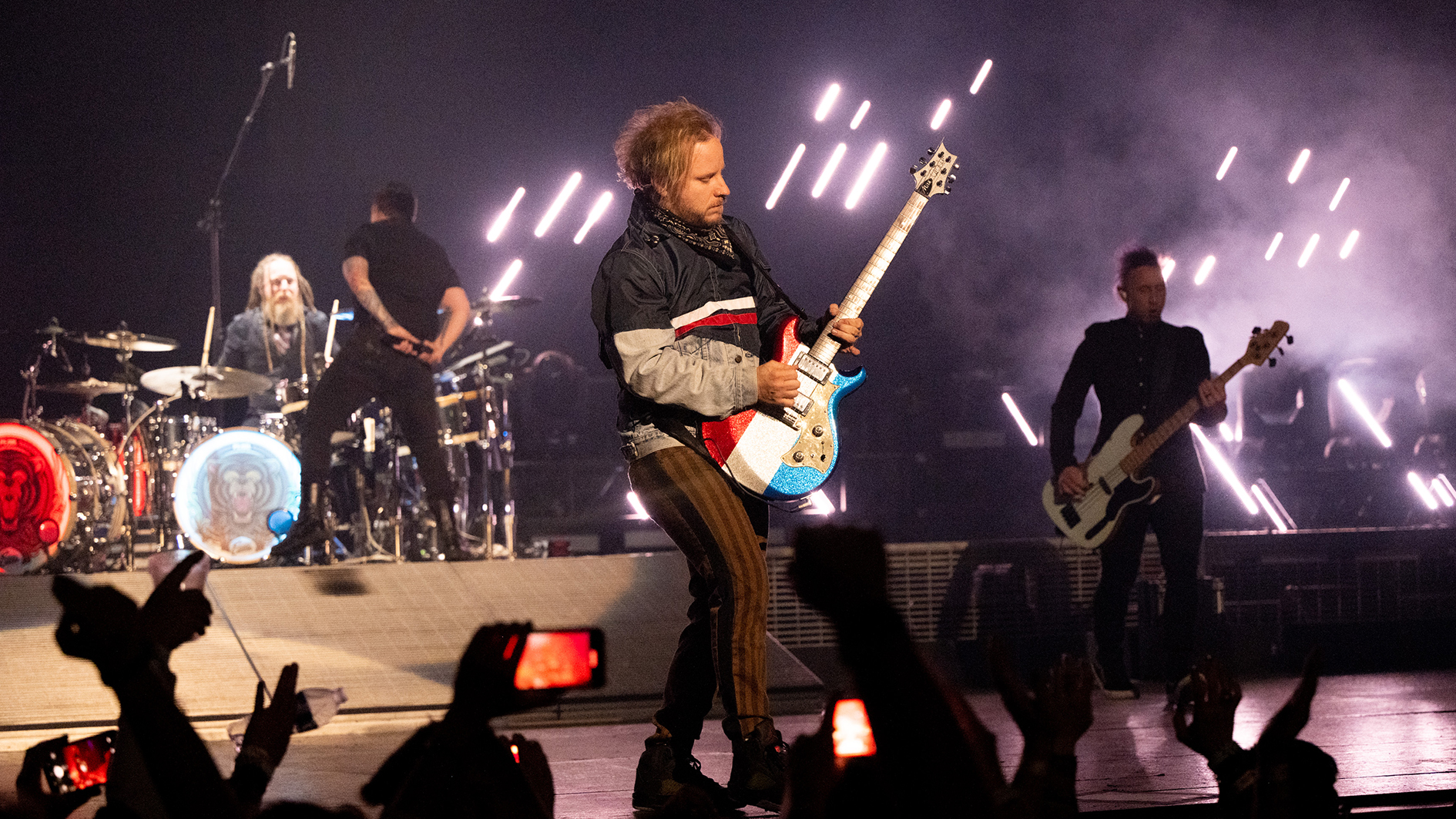Zach Myers on Shinedown's new album, Planet Zero: “It's the sound of a band in a room playing rock 'n' roll – I think a lot of our fans missed that”
The guitarist talks using “milk crates” full of pedals on the Florida hard-rockers' forthcoming concept album, why they steered clear of reverb, and how a stock Kemper preset crept onto the final recording

“I am not an impressive guitar player in the sense of impressive guitar players, but come see a live show and you’ll never hear me miss a note – that's kind of where my strengths lie. But you know, I got a vibrato that'll slay…”
Zach Myers does what he does, and there’s no denying that he does it well. The same goes for his band, too.
Multi-platinum selling southern-rockers Shinedown aren’t looking to dazzle you with complex rhythms, sweeping solos or unique song structures – this is a band that wants to get up in your face and get their hooks into you ASAP.
Which brings us to where we find Myers and Shinedown in 2022.
Having spent most of the past two years working on various projects, including Smith & Myers with Shinedown vocalist Brent Smith, and making the most of the imposed time at home with his family; Myers has, like most of us, been a keen observer to the changing world, and let’s just say he hasn’t liked what he’s seen.
Cue new album Planet Zero, a concept album that centers around the theme of a dystopian future where human behavior is heavily controlled through a planetary regulation system called Cyren.
That may sound like it’s heading into prog territory, but it’s definitely not. This is Shinedown being as direct as ever.
Get The Pick Newsletter
All the latest guitar news, interviews, lessons, reviews, deals and more, direct to your inbox!
“The concept is really this kind of dystopian future that we're kind of staring down, and just losing our humanity to be able to talk to each other and have a difference of opinion without going, ‘Oh, you're a bigot’ or, ‘That's hate speech’. People can say that they like a certain political candidate, and they're met with, ‘Oh, hate speech’. Like, I think you need to Google hate speech!” Myers explains.
I'm not trying to say we're Miss Cleo or anything, but right now we are in it. We're in the song Planet Zero. we're in every song on this record right now
The album has that retro-futuristic dystopian sci-fi vibe throughout it, but is it actually set in the future, or would you say this is happening right now?
“Yeah, it's now – you know, we wrote it a year ago. Listen, I'm not trying to say we're Miss Cleo or anything, but right now we are in it. We're in the song Planet Zero. We're in every song on this record right now.”
One of the songs I wanted to chat about in particular is The Saints of Violence and Innuendo. Can you tell me what we’re dealing with there?
“I love that song because, to me, that's a punk-rock song. That song, and [following album track] Army of the Underappreciated are to me just very Ramones, very straight-up, ‘This is the message’.
“Saints of Violence… to me is, take it to the streets, you know what I mean? It feels like people running down the street, causing chaos for the greater good of man. You know, and we saw some of that, during all this, people causing chaos for the greater good, but we also saw white kids who live in rich, white suburban neighborhoods, burning down targets and looting on behalf of the plight of someone else, when they really didn't care about the actual subject matter, they just wanted to be in the scene.
“There's lyrics in Saints... that kind of talk about that: ‘Kill the rich kids/Shoot the sadboy/Stabbed the pretty girl to go buy some new toys.’ The prequel is that: ‘We've got a ways to go/We need a stepping stone/I guess we're on our own’. It's got this gang mentality vibe: it feels very punk rock, which I'm a fan of.”
What were the influences on that from a playing perspective?
“That was Eric [Bass, Shinedown bassist and producer], actually, who wrote the riff for that. We got into this band called Dead! from the UK about in 2017 [or] 2018; they made one record called The Golden Age of Not Even Trying and they broke up. And I remember us being so bummed they broke up. I thought they should have been the biggest rock 'n' roll band of that moment.
This record is supposed to sound like a band in a room playing music – there's no reverb at all
“I feel like he might have been a little bit influenced by that because it's got that vibe to it. But again, it's a very, very punk-rock song. That riff just makes you want to run through a wall.”
A lot of this album has that kind of energy. Sonically, it’s very upfront and in your face – there doesn’t seem to be much in the way of reverb at all.
“Good eye! You're the first person to bring that up – it is a dry record! It is a band in a room playing rock 'n' roll. And I think a lot of our fans kind of miss that about the last couple of records. Because when you have a record like The Sound of Madness, and then after that your budget gets a little bigger, and you get to go make a record [with a bigger production]… you know, and we did that, especially on Amaryllis – Amaryllis had a bunch of stuff!
“But this record is a rock 'n' roll record. I mean, there are mid-tempo [songs] and ballads, but this is supposed to sound like a band in a room playing music and, to me, that's what it sounds like. You're the first person to bring that up, though – there is no reverb at all on this record! That's kind of the point.”

This was all at Eric’s studio, right? He’s built his own studio on a ranch?
“Yeah, he's got a horse farm and that's where his house is. The studio is 100 feet from his house and that's where we did the whole record.”
Did that make it a more relaxed process putting this album together?
“It depends on who you're asking. If you're asking me, yes; if you're asking Eric... He hates it when I say this: I think Eric could be the best rock producer out there, if he would actually do it with other bands, too.
“I think the biggest problem with self-producing is there's usually not an arbiter and you don't have anybody there to police yourself. And that's kind of what Eric was able to do. If you ask him right now if he'll ever produce a record again, he's going to tell you no.”
We recorded the guitar parts to Planet Zero 12 times, and what you hear on the radio right now is the demo guitar!
What caused the most headaches?
“There's always a song on every record that drives him completely insane. On the last record, it was Human Radio. On this record, it was Planet Zero. I mean, we recorded the guitar parts to Planet Zero 12 times and what you hear on the radio right now is the demo guitar!
“We went through every amp in that studio, recording that guitar part again. I'd play it, he'd play it; you know, everybody but the damn assistant engineer played it at one point, just trying to get this thing. And it went back to the main sound [that was on] the demo, which is a Kemper.”
Interesting. I was wondering if that was a Kemper – it’s got that punch to it, which Kempers do well when they’re dialed in right.
“The technology is there now; you can deny it all you want. Do I want to play through a digital rig with no cabs on stage? No, I've always had live cabs and I was always mic'ing those, and that's what I was getting.
“My rig is more digital now than it was, but even now all my sounds in EQs are all tube amps, and then the Fractal is basically effects and cabinet mimicking for front of house. But people will be thrilled to know that the sound on Planet Zero is a stock Kemper setting.”

Were you using more traditional amps as well?
“Eric has these [Marshall JCM]800s that he loves: one’s brown and one’s black. My favorite amp is the Diezel Herbert that I've loved forever, and he's got one of my Herberts there, but mostly it was the [800s] and then a bunch of smaller amps.
“He has this Epiphone combo – I forgot the name of it, but it is an amazing amp. You can get any kind of color tone you'd ever want to get on that. You can sound like the Beatles, you can sound like Tom Petty, you can sound like Bruce Springsteen…
“But this was more of a pedal record – we experimented with a lot of wild pedals on this one.”
We used a lot of wild pedals on this one, more pedals than I think we've ever used just because we had milk crates full of them
Interesting, I thought maybe a lot of the gain tone was amp-driven…
“Oh, no, we used a lot of EarthQuaker Devices pedals. The Plasma [Coil] Pedal from Third Man [and Gamechanger Audio] – we use that a ton! There's a couple different things: the Astral Destiny from EarthQuaker Devices… We used a lot of wild pedals on this one – more pedals than I think we've ever used just because we had milk crates full of them.
“The fun part of making this record is, you're playing the guitar part and Eric goes, ‘Go grab anything,’ and so you just go grab anything. Then you'll get cool solos, like the solo on Dead Don't Die is one of my favorite things we've ever done musically, because it almost sounds out of tune.
“And the reason is I'm playing the solo and Eric's taking the Whammy pedal and just moving it into weird octaves, hitting it down [and] hitting it halfway. One of the reasons I'm stressing out right now is because it's gonna be almost impossible [to recreate live].”

When it came to the actual guitars, were there any that played a key role on this album?
“This 1958 Martin D-18 was on a bunch of stuff along with Eric's Taylor, and I believe there a Prestige acoustic that we used and it sounded really good. I usually try to bring a couple acoustics in there. Eric's got a ton of guitars, but I'll try to bring this one in. I think we used it on Daylight and Hope [on Planet Zero]. This one's been on every Shinedown record since I've had it.
“The other one that gets on every Shinedown record is this ‘65 [Gibson ES-]335. This is one of those [guitars]; if the house is on fire, I'm grabbing this. Get my kids out first, then I'm going back to try and get this.
“If I show up to a session for another band, I usually bring a PRS 305 that I can make sound like any Strat or Tele in the world, and I bring [the ES-335] because I can make [it] sound like a Tele if I really want to. There's something about this guitar: it can sound like a Rickenbacker, it can sound like a 335, it can sound like a Les Paul, you can make it do anything you want.”
- Planet Zero arrives April 22 via Atlantic Records. Shinedown tour the USA starting April 1 with special guests The Pretty Reckless and Diamante – see Shinedown.com for full dates.
Chris is a contributor to Guitar World and MusicRadar with around 20 years of guitar playing experience – including writing for and recording various projects for around 15 of those. Outside of practical experience, he’s studied music throughout his life, with a particular focus on composition at university. He’s something of a 90s tragic and a sucker for anything with a groovy, metallic edge or psych and stoner vibes. Outside of music, he’s an avid cook, gardener, and rugby league lover.










